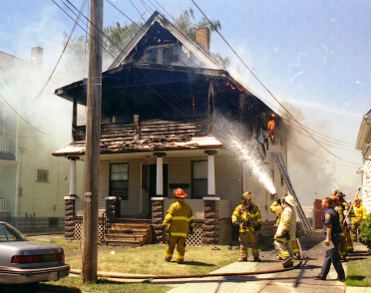-
Test Your Smoke Detectors:Test monthly and be sure to change the batteries twice a year. Never Play With Matches: Children should never play with matches, lighters, or the kitchen stove.
-
Make an Escape Plan: Know your way out of your home. Your plan should include two ways out. This way if a fire blocks one route you’ll have a plan to get out another route. Choose a meeting place outside where everyone can meet in case of a fire. Practice your escape plan.
-
Don’t Block Your Pathway Out: Keep rooms neat and all doors, windows, and hallways clear of toys and other obstructions. If you have a fire in your home you don’t want to block your way out and firefighters will have a much easier time making a rescue if your hallways, windows, and doors are not blocked.
-
Crawl Your Way Out: If you find yourself in a room that’s filled with smoke, don’t stand up and try to walk out of the room, get low or even crawl your way out if necessary. The smoke is toxic and will kill in a matter of seconds.
-
Call 911: Once you’re out of the house, call 911. Don’t stop to make the call inside the home, get out first then call!
-
Stay Out: Don’t ever go back into a building that’s on fire. If someone is still inside tell the firefighters where you think the person or pet may be in the home.
-
STOP, DROP and ROLL: If your clothes are on fire, Stop Drop and Roll. Never run, get on the ground or the floor and roll. This will put the fire out.
Fire Safety Tips
Museum Holiday Safety Tips
RESOLVE TO MAKE YOU HOME SAFER IN 2021
RING IN FIRE SAFETY
If you are like most of your friends and most of the country, you may be starting off the New Year with a resolution to improve your lifestyle. It is also time to consider one additional step to maintain and prolong your life: Fire Prevention. We here at the Western Reserve Fire Museum and Education Center are urging you to make 2021 a fire-safe year.
People feel safest at home, but the U.S. Fire Administration data shows that 83% of all fire deaths happen in the home and most of those fires are considered preventable.
Here is some safety information to help make 2021 a fire-safe year:
1. Smoke alarms can wake you up in case of a fire. Have smoke detectors on every level of your home.
2. Resolve to test all your smoke alarms. Replace your smoke alarms when they are 10yrs old. And replace batteries twice a year.
3. Cooking is the main cause of home fires. Stay in the kitchen while you are cooking. Educate everyone what to do in case of a kitchen fire. Have an ABC extinguisher in the kitchen.
4. If you have children in the home. Look for fire dangers from their point of view.
5. And lastly develop an updated escape plan for your family. Keep your plan posted and practice your escape plan regularly.
*Click the image below for a downloadable escape plan template and fill it out as a family.
Fire Safety Tips

Have Fire Safety Escape Plan
A fire safety escape plan tells everyone in your home what to do if your home catches on fire. Your family needs to discuss fire safety issues and have an escape plan. The escape plan needs to inform everyone in your family of the two safest routes out of each room in your house and where to meet outside.
When discussing fire safety issues with your family, it is also a good idea to talk about each person’s responsibilities in the case of a fire, such as who helps whom out of the house. Be sure to explain to each family member to crawl to a safe exit, don’t stop to save anything, and, if possible, to alert others by yelling “FIRE!” or beating on doors as they crawl by.
Electric stoves, ovens, stereos, heaters, and clothes dryers are responsible for the majority residential electrical fires. Follow all manufacturers’ instructions, and use all appliances carefully and responsibly.
Sometimes, no matter the precautionary fire safety steps you take, an electrical fire can still occur. If this happens, knowing the proper fire safety procedure is invaluable in keeping your home safe.
-
Do not try to handle large fires by yourself; call 911, report the fire, and tell them what is burning and if anyone is still in the house.
-
Try to get everyone out of the house.
-
If only a minor incident:
Shut off burning appliances by unplugging the cord.
Put out small fires with your home fire extinguisher.
Do not put water on electrical fires.
Educating yourself and your family on fire safety helps to lower your chances of a home fire and gives you the knowledge of what to do in the case of a fire.
These Fire Safety Tips were provided by the Western Reserve Fire Museum and Education Center and its partners:
the Cuyahoga County Fire Chiefs Association and the Cleveland Division of Fire

